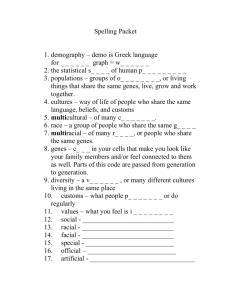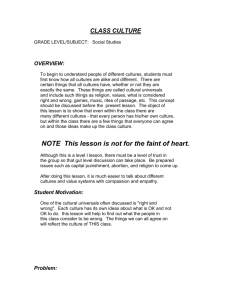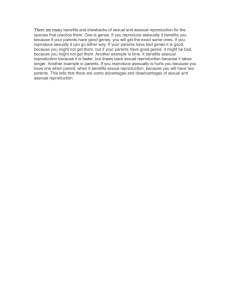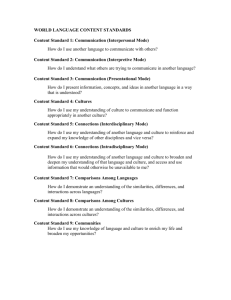Chapter 2: Culture and Nature Outline Culture and Nature
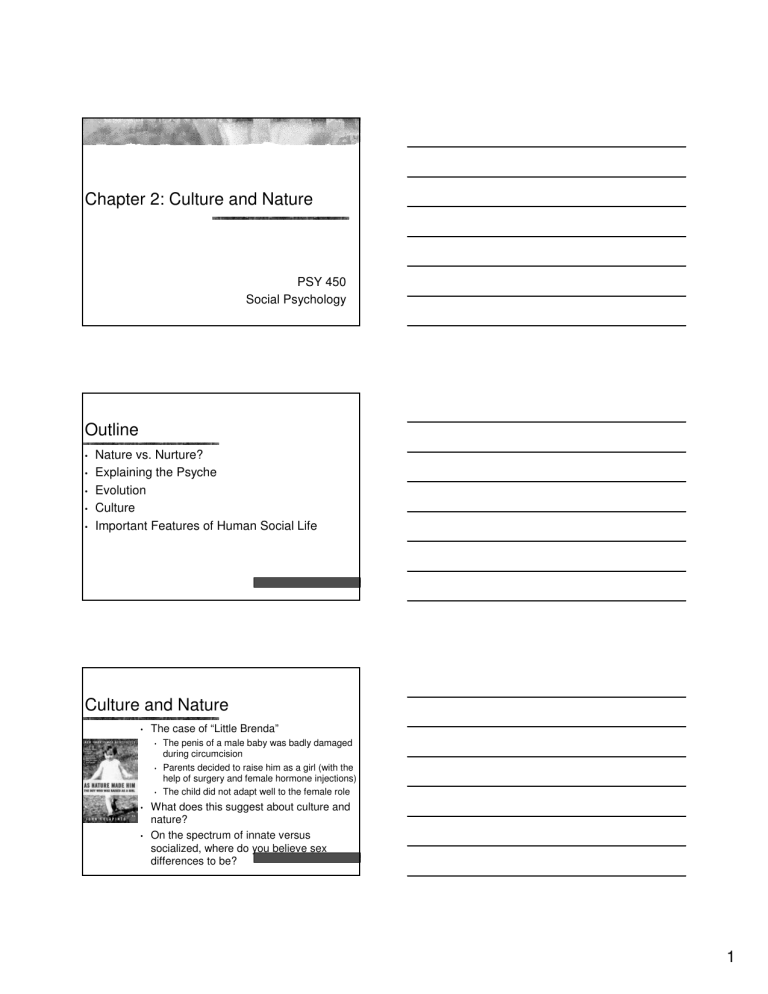
1
Compared with males, the average female…
•
•
•
•
•
•
•
•
•
•
Has 70% more body fat, 40% less muscle, and is 5 inches shorter
Is more sensitive to smells and sounds
Is twice as vulnerable to anxiety disorders and depression
Gravitates toward jobs that reduce inequalities (e.g., public defender)
Binds families together (buy 3x as many gifts & greeting cards, write 4x more personal letters, make 20% more long distance calls)
Smiles more
Is more empathic
Is more valued as a friend by both men and women
Is better at understanding nonverbal communication and expressing herself nonverbally
Earns 77% of what the average male earns
Compared with females, the average male…
•
•
•
•
•
•
•
•
•
Slower to enter puberty (by 2 years) but dies earlier (by 5 years)
3x more likely to commit suicide, 4x more likely to take Ritalin for ADHD,
5x more likely to become alcoholic, and 6x more likely to be killed by lightning
More likely to be capable of wiggling ears
Is far more likely to be a legislator (86% vs. 14%), prime minister/president (95% vs. 5%), and CEO of Fortune 500 company
(99% vs. 1%)
Is more concerned with social dominance and is more likely to be conservative
Is more likely to invite for dates, drive, and pay
Tend to be directive in their communication
Is more likely to speak assertively, interrupt others, and stare at others
Is more likely to be comfortable with “casual” sex with different partners
(48% vs. 12%) and believe that it is OK for two people to have sex even if they’ve only known each other briefly (53% vs. 30%)
Nature vs. Nurture?
•
•
•
This debate may no longer be useful
Both “nature” and “nurture” have real influences on behavior
Nature is fundamental…but nature and culture appear to shape each other in a complex interplay
•
The psychological traits that may set us apart from non-human species are those that allow us to maintain culture (e.g., language, self-concept, theory of mind)
2
Explaining the Psyche
•
Psyche is a broad term for mind which encompasses emotions, desires, perceptions, and all other psychological processes
•
Nature – Genes, hormones, brain structure, and other innate processes dictate how you will behave
•
Culture – Learned experiences from parents, society, and other sources
Nature
•
•
Theory of evolution – Focus on how change occurs in nature
Natural selection – those members of a species that survive and reproduce most effectively are the ones that pass along their genes to future generations
•
Survival until reproduction
•
Reproduction
Evolution
•
•
•
Survival – living longer
•
“Survival of the fittest”
•
Competition within and between species
Mutation – a new gene or combination of genes
Reproduction – producing offspring that survive long enough to reproduce and are capable of reproduction
•
Creation of viable offspring is a vital element of natural selection
•
Different reproductive strategies for males and females
3
Evolution and Psychology
•
In recent decades, psychologists have started to examine the evolution of behavioral tendencies
•
•
•
Evolutionary psychology is the study of the evolution of behavior using principles of natural selection
Based on the idea that evolution may “select” psychological and behavioral traits that enhance the preservation and spread of one’s genes
This has been helpful in understanding areas such as mating strategies (e.g., the function of jealousy) and emotions
Culture
•
•
Culture – The enduring behaviors, ideas, attitudes, and traditions shared by a large group of people and transmitted from one generation to the next
•
•
•
Culture as shared ideas – understanding abstract concepts as a group (e.g., freedom)
Culture as system – links people together (e.g., food production/distribution system)
Culture as praxis – shared ways of doing things (e.g., drive on the right side of the road)
In research, there is a need to consider cultural differences as well as underlying similarities
The Importance of Ideas
•
•
•
Culture consists of shared ideas
Humans choose their actions based on what something means
•
Ideas – mental representations (thoughts) that are abstract (i.e., they refer to more than a single concrete thing) and that can be expressed in language
•
Example: Laws are ideas
To understand human behavior, it is essential to understand what the behavior means to the person
4
Example of the Importance of Ideas
•
In 2005, a Danish newspaper published a series of editorial cartoons which depicted the
Islamic prophet Muhammad
•
•
Muslims were upset by these depictions because they considered them to be blasphemous
Results
•
•
•
Protests and violence (more than 100 deaths)
Danish embassies set on fire in Syria, Lebanon, and Iran
Various death threats
Social Animal or Cultural Animal?
•
•
Social Animal – seek connections to others
•
•
•
•
•
Includes humans but also many other animals
Work together
Learn from one another
Help kin
Resolve conflict with aggression
Cultural Animal – evolution shaped human psyche to enable humans to create and take part in culture
•
•
•
•
•
•
Defining trait of what makes us human
Division of labor
Deliberately share knowledge
Help strangers
Resolve conflict with many alternatives
What has been passed on to you from previous generations?
The Individual and Society
•
Social Brain Theory
•
The human brain may have evolved because of our social system
•
In other species, larger brains tend to be linked with more complex social systems
(Dunbar, 1993,
1996)
5
Advantages of Culture
•
Human brain allows us to capitalize on the virtues of culture
•
•
•
•
Language
Progress - to build on experience of others
Division of Labor
Exchange of Goods and Services
•
Have humans evolved to participate in culture?
Interplay of Nature and Culture
•
•
All cultures are confronted with certain tasks…
•
•
Food
Shelter
•
Procreation
Organization
•
…but cultures find diverse ways to satisfy these demands
Example: Food
•
Some foods are poisonous or have no nutritional value…so we tend to avoid them
•
However, other potential food sources are considered taboo because of cultural standards
Culture and Food Preferences
•
•
•
•
•
•
•
•
Americans eat oysters but not snails.
The French eat snails but not locusts.
The Zulus eat locusts but not fish.
The Jews eat fish but not pork.
The Hindus eat pork but not beef.
The Russians eat beef but not snakes.
The Chinese eat snakes but not people.
The Jale of New Guinea find people delicious.
•
What are some of the reasons that different cultures vary in the foods they eat?
6
•
•
•
•
•
•
Sex and Culture
Is sex simply a matter of genes and hormones causing people to feel desire?
Does culture play a role in our sexual behavior?
Some features are common across cultures
• e.g., men have more sexual partners; primary (if not only) means for procreation; same basic sexual activities have existed for thousands of years (with the exception of sadomasochistic behaviors)
Common features influenced by culture
• e.g., rules about who can have sex; preventing conception; prostitution
Differences BETWEEN cultures
• e.g., virginity at marriage (required in Turkey but forbidden in Guam); masturbation is a capital crime according to Indonesian law; homosexual acts are normative in New Guinea prior to marriage; Lebanese men are not allowed to have sex with male animals but they can have sex with female animals
Differences WITHIN cultures
• e.g., number of partners (some are virgins at 30 while others have dozens of partners while still in high school); choice of sexual activities; attitudes toward pornography
•
•
•
•
Tradeoffs
Tradeoffs – a choice in which taking or maximizing one benefit requires either accepting a cost or sacrificing another benefit
•
Small cars use less gas but they may sacrifice safety, comfort, and convenience
Tradeoffs are an important aspect of human social life…we are constantly being confronted with these sorts of decisions
Time Tradeoffs – Now versus Tomorrow
•
Delay of gratification (e.g., having high credit card bills)
•
Natural selection has not favored concerns about the distant future…but a future orientation and delay of gratification skills are important for cultural beings
Political Tradeoffs
•
Laws address current problems but may create new ones
•
•
•
•
Ohio law in the 1990s freed pregnant female prisoners…which led female prisoners to having a lot of unprotected sex with guards and attorneys to gain release from prison
Protecting the environment vs. cost of energy
Taxes to government services
Politicians recognize these tradeoffs but tend to ignore them during campaigns
•
This is also a tradeoff: In order to win elections, you need to oversimplify the issues and ignore the complications
Important Features of
Human Social Life
•
The Duplex Mind
•
Interpersonal Functions
•
Conflicts Between Nature and Culture
•
Putting People First
7
Example of the Duplex Mind
•
•
•
•
I want you to list the numbers from 1 to 10 in numeric order out loud as quickly as you can when I say “GO”
Now, I want you to list the numbers from 1 to 10 in alphabetical order as quickly as you can when I say
“GO”
Which is easier? Why?
The automatic system is important to our behavior
•
•
Do you have to think “right foot…left foot…right foot” when you walk?
Does it take much attention for you to tie your shoes in the morning? To drive a car?
The Duplex Mind
•
•
•
Automatic system
•
•
•
•
•
•
•
Outside of consciousness
Runs a lot of simple operations
Quick and efficient
Increased focus on the role of automatic system
Can learn, think, choose and respond
Has ideas and emotions
Knows “self” and other people
Conscious system
•
•
•
•
Carries out complex operations
Focuses on complex thinking and logic
Allows us to deal with novel situations
Allows us to combine information in a rule-driven manner
These systems work together
•
These systems may come into conflict and the conscious system can override the automatic system
Interpersonal Functions
•
•
•
One of the basic functions of the self is to gain acceptance from others
•
Many of our inner processes serve interpersonal functions
(e.g., self-esteem)
We have to be able to understand what other people want and expect…then try to modify our behavior to meet those expectations
What are some of the things that people do to obtain social acceptance?
• e.g., behave politely, acquire skills, get an education, earn credentials, find steady employment, attract and maintain romantic relationships
8
Conflicts Between Nature and Culture
•
•
“Nature says go, culture says stop”
Nature – impulses, wishes, automatic responses
•
Tends to be “go” oriented
•
Culture – teaches self-control and restraint
•
Tends to be “no” oriented
•
…but there are certainly exceptions
•
Nature’s disgust reactions (No!)
•
Cultural timetable for meals (Go!)
Selfish Impulse Versus Social Conscience
•
Nature tends to make us selfish
•
Preservation of self
•
Culture helps us resist selfish impulses
•
Consideration of what is best for society
•
Moral Code
•
Laws
Bad Is Stronger Than Good
•
•
•
•
•
Are negative things “stronger” than good things?
•
•
Think about a time when someone said something bad about you
How memorable or powerful is that compared to good things that people have said?
Bad things tend to have greater psychological impact
•
Trauma versus joyful event
May be an innate tendency that is linked with survival
Positive found in cultural ideas
•
Positive psychology
Since bad things are stronger than good, we need more good experiences than bad ones for us to flourish (about three times as many)
9
Putting People First
•
People get most of what they need from other people (including information)
•
Culture serves as a “general store” of information
•
People look to each other first
•
Asch’s research on conformity
Conclusion
•
•
Human behavior results from the interplay of nature and culture
Human life is enmeshed in culture
•
Diverse but share common themes
•
Creates unique problems
•
Is shared from generation to generation
10
